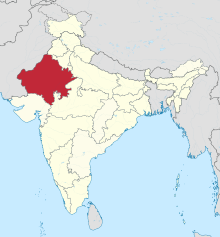Rajasthan

Rajasthan is India's largest state by area. It is located on the north western side of the India, where it comprises most of the wide and inhospitable Thar Desert (also known as the "Rajasthan Desert" and "Great Indian Desert") and shares a border with the Pakistani provinces of Punjab to the northwest and Sindh to the west, along the Sutlej-Indus river valley. Elsewhere it is bordered by five other Indian states: Punjab to the north; Haryana and Uttar Pradesh to the northeast; Madhya Pradesh to the southeast; and Gujarat to the southwest. Its capital and largest city is Jaipur. Its current Governor is Kalraj Mishra, its current Chief Minister is Bhajan Lal Sharma, and its Legislative Assembly is currently controlled by the Bharatiya Janata Party-led National Democratic Alliance.
| This geography-related article is a stub. You can help out with Wikiquote by expanding it! |
Quotes
[edit]- Curiously, an astonishing number of names of towns and villages in western Rajasthan (the heart of the Thar Desert) have names ending in the word ‘sar’, such as Lunkaransar, with ‘sar’ meaning ‘lake’... Why should all those places be named after non-existent lakes? An unwary tourist reading a map of western Rajasthan might as well assume that the region is some kind of a Lake District!
- Danino, M. (2010). The lost river : on the trail of the Sarasvatī. Penguin Books India.
- The pagod moulders on Mokundra's plain,
And 'mid its ivied towers the winds complain.- Nicholas Michell, Ruins of Many Lands, 2nd ed. (1850), Book I, Part 3
- "The pagoda of Bheems Ghaori in the Mokundra, now in ruins, is very remarkable," observes James Tod, in his travels, "for the resemblance it bears, as regards massiveness of style, to Egyptian monuments."
- If we compare the antiquity and illustrious descent of the dynasties which have ruled, and some which continue to rule, the small sovereignties of Rajasthan, with many of celebrity in Europe, superiority will often attach to the Rajput.
- James Tod, Annals and antiquities of Rajast'han

